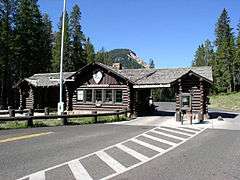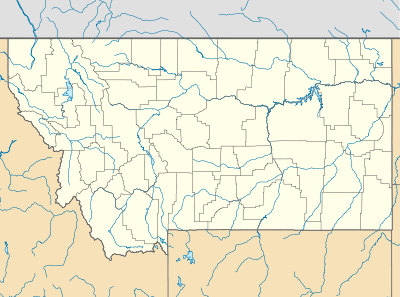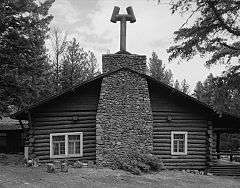Northeast Entrance Station
|
Northeast Entrance Station | |
 | |
  | |
| Location |
|
|---|---|
| Coordinates | 45°0′17″N 110°0′33″W / 45.00472°N 110.00917°WCoordinates: 45°0′17″N 110°0′33″W / 45.00472°N 110.00917°W |
| Built | 1935 |
| Architect | NPS Branch of Plans & Design; George Larkin |
| Architectural style | Other |
| NRHP Reference # | 87001435 |
| Significant dates | |
| Added to NRHP | May 28, 1987[1] |
| Designated NHL | May 28, 1987[2] |
The Northeast Entrance Station to Yellowstone National Park, in Park County, Montana, is a rustic log building that serves its purpose admirably. Designed by the National Park Service Branch of Plans and Design under the direction of Thomas Chalmers Vint, it was built in 1935.[3] The entrance station straddles U.S. Route 212 (US 212) west of Cooke City-Silver Gate. A combined ranger station and residence is located nearby. All buildings were constructed by George Larkin of Gardiner, Montana.[4]
Description
The Northeast Entrance Station spans the center of the road into the park from Cooke City. A central block housing the office and two checking windows is flanked by smaller blocks, each housing a checking window and joined to the main block by a long gabled roof that spans the ensemble. Each block is marked by a cross gable proportional to the block's size. The walls are lodgepole pine logs cut within the park with saddle-jointed corner, randomly beveled. Log poles support the shingled roof. The entrance station rests on a local stone foundation. A stone chimney for the heating stove projects above the central block. Earth floors have been replaced with concrete slabs.[5]
The ranger residence is a matching log building, rectangular in plan with a small extension housing an office. The residence is one story with seven rooms. Unusually for its time it was insulated during construction to try to prevent ice from building up on the roof.[5]
Influence
The Northeast Entrance Station was featured in a planbook published by the National Park Service as an example of appropriate design for national and state park structures.[6] Park and Recreational Structures was greatly influential in the design of park facilities in North America in the late 1930s, when many parks were being developed as job-creation projects. The design of the entrance station may itself have been influenced by the 1932 decision of the small community of Silver Gate, just beyond the entrance station, to build entirely in log construction.[5]
Historic designation
As a pristine example of its type, and being an ambitious one for its time, it was declared a National Historic Landmark in 1987, and was placed on the National Register of Historic Places at the same time.[2][1][5]
References
- 1 2 National Park Service (2007-01-23). "National Register Information System". National Register of Historic Places. National Park Service.
- 1 2 "Northeast Entrance Station". National Historic Landmark summary listing. National Park Service. Retrieved 2007-10-13.
- ↑ ""Architecture in the Parks: A National Historic Landmark Theme Study: Northeast Entrance Station", by Laura Soullière Harrison". National Historic Landmark Theme Study. National Park Service. Retrieved 2007-10-24.
- ↑ "Northeast Entrance Station". Wyoming State Historic Preservation Office. Retrieved 15 December 2010.
- 1 2 3 4 Laura Soullière Harrison (1985). "National Register of Historic Places Inventory-Nomination: Northeast Entrance Station" (pdf). National Park Service. and Accompanying 8 photos, exterior and interior, from 1985. (1.03 MB)
- ↑ Good, Albert H. (1999 (reprint of 1938 edition)). Park and Recreation Structures. Princeton Architectural Press/National Park Service. p. 29. ISBN 978-1-56898-171-0. Check date values in:
|date=(help)
External links
- Northeast Entrance Station at the Wyoming State Historic Preservation Office
- Architecture in the Parks: A National Historic Landmark Theme Study: Northeast Entrance Station, by Laura Soullière Harrison, 1986, at National Park Service.
- Historic American Buildings Survey (HABS) No. MT-50, "Northeast Entrance Station, Northeast Entrance, Silver Gate vicinity, Park County, MT"
